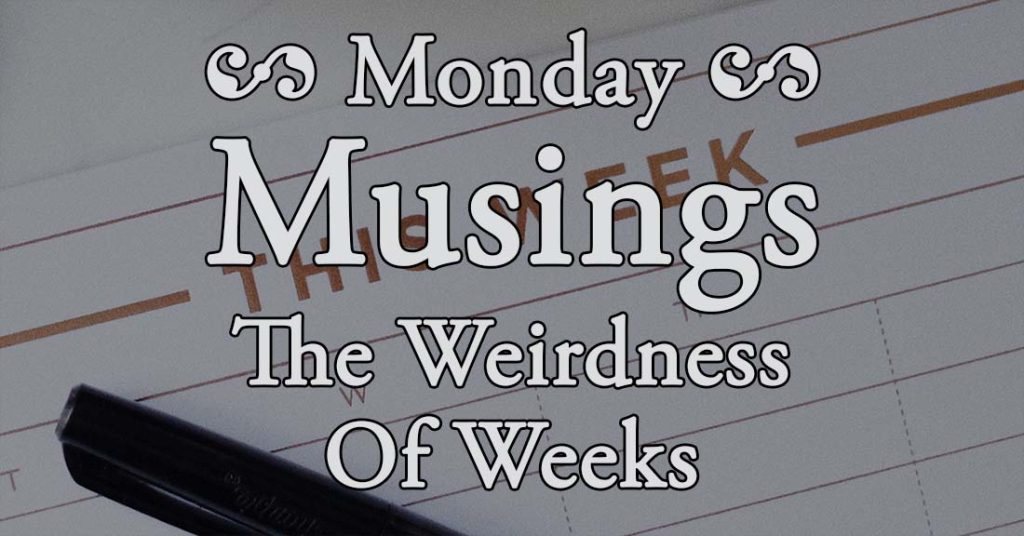Share This Musing
The Weirdness Of Weeks
Sarah, the manager of one of our branches, barged into my office. “How are we going to handle this?”
I leaned back in my chair, puzzling through the dozen problems facing me. Which one involved Sarah? “Handle what?”
“Have you looked at the calendar? Thanksgiving falls on a Thursday this year.”
I felt the eyebrow raise on my face. My expression must have triggered the realization of what she had just said. Her eyes grew wide and her face turned red. She backed toward the door and sputtered, “Never mind.”
Sure it’s a funny story. Sarah (not her real name, but a real event that happened a couple decades ago) laughed about it. It became a joke between us.
But for a company that served the needs of hundreds of other companies, all with different closing schedules around holidays (and some not closing at all), we had to think through staffing to support our clients. Some holidays—like Thanksgiving, Memorial Day, and Labor Day—fall on the same day of the week every year. Others—think Christmas, New Year’s Day, and Independence Day—fall on the same date, so are different days of the week.
That story came to mind when I read an interview in the Atlantic about the seven-day week (my interesting link of the week) with David Henkin, a historian at UC Berkeley. He highlights how a week, unlike other measurements of time, doesn’t have a natural cycle.
A year is roughly the amount of time it takes the earth to circle the sun. A month, though distorted over the centuries for various reasons, signifies the phases of the moon (in fact, the word month derives from moon). A day equates to a rotation of the earth.
But a week is different. It has historical and religious foundations (see below), but no connection to the natural world. Outside of observing the Sabbath, the average person for millennia wasn’t concerned with weeks. Agrarian cultures tended to crops based on weather, not calendars. Hunters pursued game when and where it was plentiful. Warriors battled based on their own beliefs, superstitions, or orders. Few kept schedules and appointments. No one carried a calendar in their pocket.
The industrial revolution changed that. As people traveled to and from their employment rather than living where they worked, the demand for a scheduled workweek grew. Ultimately, within the last century or so, it became a five-day work week followed by a two-day weekend for much of the world.
On that weekend, though, people wanted to shop, eat, and play. The old days of stores being closed on Sundays disappeared. An alternate workweek developed in the service world where more people worked on the weekend rather than during the week. As many people now work a non-traditional week as a traditional.
Even in places that operate around the clock and every day of the year, the workweek impact is obvious. Go into a hospital on a weekday, and the administrative offices and elective surgical suites are busy. On the weekends, they are closed or only staffed minimally while the trauma department ramps up for the weekend.
Which makes me wonder if the weirdness of the week may some day fade into oblivion. The last year and a half living in the zombie apocalypse may even have sped up its demise with so many people embracing remote work. This is especially true among people who worked the traditional Monday through Friday week.
The first work-from-home experiment I was involved in was a disaster. Technically, it worked fine. The employee managed our transportation network which was done entirely by telephone at the time. She drove to the office, sat at her desk, and held a phone to her ear all day. Why not, she asked, couldn’t she do that from home? We tried it. It worked great and she saved commute time.
The downside was her co-workers were jealous of the arrangement. They perceived she got something they didn’t. In a day before ubiquitous personal computers, home internet, and mobile phones, the other jobs didn’t fit.
Within a few years, though, things evolved. At another company, I rarely saw one of my employees. She not only didn’t come to the office; she didn’t live within a thousand miles of it. But she was a superstar with a technical expertise. Her co-workers might have been envious, but they understood and supported her opportunity.
Last year forced the issue for everyone. Many office workers went home. Zoom became the backbone for communication (or, at least, allowed the numerous unnecessary but calendar-filling meetings to continue). Now that offices are reopening, many workers are questioning why.
The downside of remote work, though, is the inability to get away. If the office is only steps away, why can’t you do one more task?
For me, the week means little. I walk into my home office and write until lunchtime six days a week. Most afternoons are spent on other work tasks (marketing, these musings, etc.). The people I interact with (editors, designers, etc.) mostly work from home as well. For my last book, my copy editor and I were exchanging emails on a Sunday afternoon as she sat at her mother’s house.
On the flip side, my Ever Patient Partner In Life and I declare a different day every week as our “weekend.” We look at the weather and events happening and decide to take off for a relaxing day whenever it fits best. Living in a tourist town, that’s almost never a Saturday or Sunday when everyone else is crowding around. But on a Tuesday or Wednesday or whatever, we get to go about anywhere without the mobs.
One of the beauties of Asheville is how many great towns are no more than an hour or two away. We can go to Greenville South Carolina or Knoxville Tennessee or Bristol Virginia or so many other places and be back home before the evening rush hour.
I also can take a break in the middle of any day and go walking through the neighborhood. When I do, I find so many people out doing the same thing. Most of them are working from home, on their own schedules.
So I wonder what the evolution will be over the next few years. Will less and less people pay attention to a workweek? What about schools? Will they continue to be five days a week? Will education move more and more online?
I don’t know the answers. My job is to imagine different scenarios and write about them. It’s fun to think about.
The one thing I do know is that Thanksgiving will be on a Thursday. This year and every year.
Why Does A Week Have Seven Days?
Seven days hasn’t always been the standard. The Etruscans had an eight-day calendar which the ancient Romans adopted. However, when the Romans encountered the far older Babylonian calendar, the seven-day week became dominant and was finally officially adopted by Emperor Constantine in A.D. 321.
But where did the seven derive?
The Babylonians in 2300 B.C. knew of seven celestial bodies. The days of the week evolve from that universe—the sun (Sunday), the moon (Monday), Mars (Tuesday), Mercury (Wednesday), Jupiter (Thursday), Venus (Friday), and Saturn (Saturday).
I won’t take you down the etymology rabbit hole of how each of the planets ties to a day without an obvious connection, but let me use one as an example. The Roman god Mars equates to the Greek god Ares and the Norse god Tyr which in Old English translates to Tiw. So the Old English Tiwesdaeg (Tiw’s day) evolved to Tuesday but the planet name evolved to the Roman Mars. Yep, you really don’t want me to do the other days of the week.
The Abrahamic religions (Christianity, Judaism, and Islam) trace their seven-day week and the Sabbath (Shabbat) to the creation story of Genesis. The first five books of the Bible—the Pentateuch or Torah—are thought to have been recorded from their oral histories around the time the Persians conquered Babylonia and granted Jerusalem local autonomy.
Summarizing thousands of years of history, the seven-day week appears to have originated in Babylon, incorporated names from Norse, Greek, and Roman mythology, and influenced the Abrahamic religions. The strong Middle Eastern and European cultures interacted with the rest of the world (being a nice way to summarize another couple thousand years of wars, invasions, and more) and their calendar became the dominant time keeping system.
Interesting Links – Weeks and Books
As mentioned in the main post above, enjoy the article We Live By A Unit Of Time That Doesn’t Make Sense in The Atlantic.
Also, I mentioned last week that Malaprops, an indie bookstore in downtown Asheville, would be stocking my books in store. I’m pleased to announce they have arrived. If you find yourself in downtown Asheville, stop by and enjoy a great store. And I’m happy to suggest a Christmas present or three you can pick up for a fellow book lover.
Gratuitous Dog Picture

A certain pair of mischief makers are enticed to behave on walks with treats which has led to many scenes like this—”We’re being good so we get treats, right?” Have Typhoon and Roscoe ever looked so innocent?
Happy Thanksgiving!
My “weekend” break from writing will be Thursday this week. We will be cooking a Thanksgiving feast and enjoying the company of my sister, brother-in-law, and Super Nephew.
May your Thanksgiving be happy and festive and may you have much to be thankful for.
Background title image is courtesy Jazmin Quaynor
Support The Musings
Call it a tip. Or the euphemestic "Buy me a coffee." I prefer patronage. Generous patrons have supported artists throughout history. Whatever you want to call it, if you enjoyed this post, consider making a donation to help offset my costs. Your support will help keep my stories ad free. Click here to make a contribution of any amount.
5 Comments
Leave a Comment
Monthly Reader Survey
Each month, I ask my readers a question or two. Sometimes, my questions are random fun things that have nothing to do with books. Other queries are about reading and writing. Join in the fun and answer this month's survey. The results (and a new survey) will be shared later in the month.
Monthly Reader Survey
Each month, I ask my readers a question or two. Sometimes, my questions are random fun things that have nothing to do with books. Other queries are about reading and writing. Join in the fun and answer this month's survey. The results (and a new survey) will be shared later in the month.


Wishing you and your family a Very Happy Thanksgiving too. I bet those 2-(Typhoon Phooey and Roscoe P)won’t look AS innocent when waiting for some turkey tidbits to fall on the floor?
I also enjoyed reading about one of the FIRST work from home experiments for a woman you knew. WHO KNEW that someday it would be so popular?
Typhoon and Roscoe look like the best boys ever! So obedient and never a trickster thought goes through their minds. 🙂
Love it.
Thanks for the dive into the creation of week(s). I will be interested to see how the work from home continues to evolve. I have to admit I love it.
Happy Thanksgiving
Please explain Hu-Dad how those faces of Typhoon and Roscoe P could be mischievous?? You must be talking about 2 other Huskies! Even as I typed it I laughing! Enjoy your week!
Happy Thanksgiving to you & your Family & to the Herd as well since the “Bad Boys” were so good maybe a little taste of turkey too
The dynamic duo in classic poses.